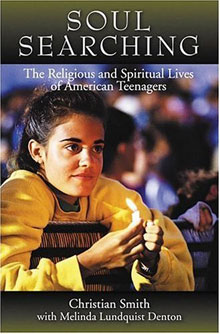Book Notes
 Christian Smith and Melinda Lundquist Denton, Soul Searching: The Religious and Spiritual Lives of American Teenagers (Oxford: Oxford University Press, 2005), 346pp.
Christian Smith and Melinda Lundquist Denton, Soul Searching: The Religious and Spiritual Lives of American Teenagers (Oxford: Oxford University Press, 2005), 346pp.
First the good news. In their ground-breaking National Study of Youth and Religion funded by the Lilly Endowment, the results of which are published in their new book Soul Searching: The Religious and Spiritual Lives of American Teenagers (Oxford University Press, 2005), Christian Smith (the Stuart Chapin Distinguished Professor of Sociology at UNC and a committed Christian) and Melinda Lundquist Denton of the University of North Carolina (Chapel Hill) document that teenagers overwhelmingly admire their parents as the single greatest influence in their lives, and gladly imitate their religious beliefs. Further, their study showed that teenagers actually like church. The conventional wisdom of teenage alienation from parents and hostility toward religion is an entrenched but erroneous stereotype, they argue.
Now for the bad news. When Smith and Denton asked these teenagers to describe the particulars of their religious faith, they were "incredibly inarticulate" about even the most basic tenets of their beliefs and practices. Rather, the vast majority of kids were abysmally ignorant of the religion they espoused. Here, for example, is the response of a 15-year-old who attends church four or five times a week, when asked to articulate her faith:
"[Pause] I don't really know how to answer that. ['Are there any beliefs at all that are important to you? Really generally.'] [Pause] I don't know. ['Take your time if you want.'] I think that you should just, if you're gonna do something wrong then you should always ask for forgiveness and he's gonna forgive you no matter what, cause he gave up his only Son to take all the sins for you, so..."
This from their scientific survey of 3,290 teenagers (ages 13-17) and parents, and 267 personal interviews, conducted across four years (2001–2005). Smith and Denton conclude that most "Christian" kids really operate with a vague sort of Moral Therapeutic Deism: be nice, don't do bad, for a remote deity wants you to be happy and feel good about yourself. In other words, says Smith, "we can say here that we have come with some confidence to believe that a significant part of 'Christianity' in the U.S. is actually only tenuously Christian in any sense that is seriously connected to the actual historical Christian tradition." If these kids reflect the biblical illiteracy of their parents, which I suspect is the case, and if we add to this portrait the depressing conclusions about Christian lifestyles in Ron Sider's The Scandal of the Evangelical Conscience (2005), then American born-again believers have a long, long way to go in fidelity to the apostolic way of life.
If you cannot read Soul Searching, there are two brief reviews that I enjoyed. See Andy Crouch, "Compliant But Confused," in Christianity Today, April 2005, p. 98; and Michael Cromartie's interview with Christian Smith, "What American Teenagers Believe," in Books and Culture, January-February 2005, pp. 10–11.


